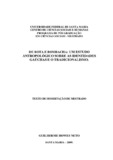| dc.creator | Howes Neto, Guilherme | |
| dc.date.accessioned | 2010-04-01 | |
| dc.date.available | 2010-04-01 | |
| dc.date.issued | 2009-12-18 | |
| dc.identifier.citation | HOWES NETO, Guilherme. With boots and bombachas: an anthropological study on gaúchas identities and traditionalism. 2009. 134 f. Dissertação (Mestrado em Sociologia) - Universidade Federal de Santa Maria, Santa Maria, 2009. | por |
| dc.identifier.uri | http://repositorio.ufsm.br/handle/1/6200 | |
| dc.description.abstract | With boots and bombachas (a typical pair of pants worn by people called gaúchos in Rio Grande do Sul/Brasil): an anthropological study on Gaúchas (the so called culture from the gaúchos) identities and Traditionalism is the title of the dissertation submitted to the Graduation Program in Social Sciences of the Universidade Federal de Santa Maria Rio Grande do Sul/Brazil, in the Social Identities and Ethnic Groups Area, under the supervision of Prof. Dr. Ceres Karan Brum. The aim of the present research is referring to gaucho s staging and identities meanings in Rio Grande do Sul, Brazil. Within this context the paper investigates the circularity of the interpretive flows throughout the history of Rio Grande do Sul and, still nowadays, on the emblematic character of the gaúcho, including the representations and practices of countryman, projections and interfaces between the symbolic farm laborer and the real farm laborer, their approaches and their distances, their symbolic universes being them: shared, disputed or separated. It is proposed to understand this process as a circularity, forming interpretative flows between the rural and urban, between the countryside and the city, understanding this relationship as a dialogue, with exchanges and interfaces between traditionalist men from the city and those who are from the farms, who distribute these identities in a constant and intermittent way, not building a single track that could be modeled and copied, true and false, real and imaginary. It is also tried to demonstrate that the identity of the urban gaúcho, created from the model of rural south-Brazilian men, is reinvented in the city and it is developed in the country with new practices and representations, which are also appropriate and re-signified in the farms. By doing so, the country men give a new meaning to the traditional practices and return to the city with new practices and a representations about what is to be a gaúcho. Throughout this process it is tried to understand the context between country and city, with a constant flux of interpretations and re-interpretations of the same symbolic universe, which are the interfaces between the traditionalists from the city and those from the farms. | eng |
| dc.format | application/pdf | por |
| dc.language | por | por |
| dc.publisher | Universidade Federal de Santa Maria | por |
| dc.rights | Acesso Aberto | por |
| dc.subject | Identidade gaúcha | por |
| dc.subject | Tradicionalismo | por |
| dc.subject | História regional | por |
| dc.subject | Gaúcha identity | eng |
| dc.subject | Traditionalism | eng |
| dc.subject | Regional history | eng |
| dc.title | De bota e bombacha: um estudo antropológico sobre as identidades gaúchas e o tradicionalismo | por |
| dc.title.alternative | With boots and bombachas: an anthropological study on gaúchas identities and traditionalism | eng |
| dc.type | Dissertação | por |
| dc.description.resumo | De bota e bombacha: Um estudo antropológico sobre as identidades gaúchas e o tradicionalismo é o título do texto dissertativo apresentado ao programa de Pós Graduação em Ciências Sociais, da Universidade Federal de Santa Maria, Área de Concentração Identidades Sociais e Etnicidade, sob orientação da Profª Drª Ceres Karan Brum. O tema central desta pesquisa se refere às representações e as significações das identidades do gaúcho no Rio Grande do Sul. Nesse contexto, busco entender a circularidade dos fluxos interpretativos dados ao longo da história do Rio Grande do Sul e ainda hoje, sobre a figura emblemática do gaúcho, entre as representações tradicionalistas1 e as práticas dos peões de estância, as projeções e interfaces entre o peão simbólico e o peão real, suas aproximações e seus distanciamentos, seus universos simbólicos compartilhados, disputados ou dissociados. Proponho entender este processo como uma circularidade, formando fluxos interpretativos entre o rural e o urbano, entre o campo e a cidade, entendendo esta relação como um diálogo, no sentido de trocas e interfaces entre peões tradicionalistas e peões de estância, que fazem circular estas identidades de maneira constante e intermitente, não constituindo uma via única de modelo e cópia, verdadeiro e falso, real e imaginário. Procuro demonstrar que essa identidade gauchesca urbana, criada ao modelo do homem rural sulino, reinventa-se na cidade e devolve ao campo novas práticas e representações, que por sua vez, são também apropriadas e re-significadas nas estâncias. Desta forma, os peões de estância re-significam as práticas tradicionalistas e devolvem para a cidade novas práticas e representações sobre o gauchismo. É dessa maneira que busco entender o contexto campo e cidade. Um constante fluxo de interpretações e re-interpretações acerca de um mesmo universo simbólico, que são, as interfaces entre os peões tradicionalistas e peões de estância. | por |
| dc.contributor.advisor1 | Brum, Ceres Karam | |
| dc.contributor.advisor1Lattes | http://lattes.cnpq.br/4090748487764411 | por |
| dc.contributor.referee1 | Maciel, Maria Eunice de Souza | |
| dc.contributor.referee1Lattes | http://lattes.cnpq.br/2937021383580285 | por |
| dc.contributor.referee2 | Rahmeier, Clarissa Sanfelice | |
| dc.contributor.referee2Lattes | http://lattes.cnpq.br/5846988158613459 | por |
| dc.creator.Lattes | http://lattes.cnpq.br/5587890154156833 | por |
| dc.publisher.country | BR | por |
| dc.publisher.department | Sociologia | por |
| dc.publisher.initials | UFSM | por |
| dc.publisher.program | Programa de Pós-Graduação em Ciências Sociais | por |
| dc.subject.cnpq | CNPQ::CIENCIAS HUMANAS::SOCIOLOGIA | por |


